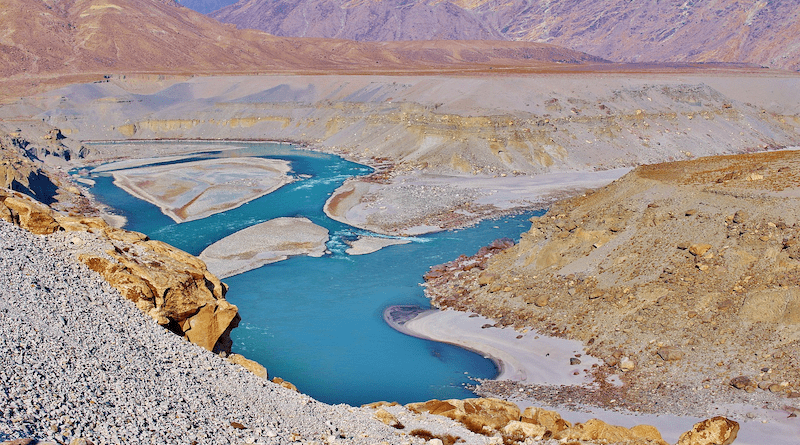Climate Change And Its Implications For Pakistan And World – OpEd
By Asad Ali
Climate change is one of the most pressing global challenges of our time, with far-reaching implications for both individual nations and the world as a whole. It refers to the long-term alteration of Earth’s average weather patterns, including changes in temperature, precipitation, and extreme weather events, primarily caused by human activities such as the burning of fossil fuels, deforestation, and industrial processes.
Climate change is primarily driven by the accumulation of greenhouse gases (GHGs) in the Earth’s atmosphere. These gases, including carbon dioxide (CO2), methane (CH4), and nitrous oxide (N2O), trap heat from the sun and prevent it from escaping into space, creating a greenhouse effect. The burning of fossil fuels for energy production, transportation, and industrial processes is the largest contributor to CO2 emissions. Forests act as carbon sinks, absorbing CO2 from the atmosphere. Deforestation not only releases stored carbon but also reduces the planet’s capacity to absorb CO2.
The consequences of climate change are already being felt across the globe and are expected to intensify in the coming decades. These effects encompass various aspects of the environment and human society. Global average temperatures are increasing, leading to more frequent and severe heatwaves. This can have dire consequences for agriculture, water resources, and human health.
Likewise, the warming of the planet has resulted in the melting of polar ice caps and glaciers, contributing to rising sea levels. This poses a significant threat to coastal communities and low-lying areas. Climate change has also led to an increase in the frequency and intensity of extreme weather events, including hurricanes, droughts, floods, and wildfires. Changing climate conditions can disrupt ecosystems, leading to species extinction and threatening biodiversity.
Increased CO2 levels in the atmosphere are absorbed by oceans, causing them to become more acidic. This harms marine life, including coral reefs and shellfish.
Vulnerability of Pakistan to Climate Change
Pakistan is highly vulnerable to the impacts of climate change due to its geographical location and socio-economic factors. For example, Pakistan’s water resources are heavily dependent on glacial meltwater from the Himalayan and Karakoram ranges. As these glaciers shrink, the country faces the threat of water scarcity, affecting agriculture and drinking water supplies. Agriculture is a vital sector of Pakistan’s economy, employing a significant portion of the population. Changing precipitation patterns and increasing temperatures can reduce crop yields and disrupt food security.
Pakistan is prone to extreme weather events, such as floods and droughts. Climate change is expected to exacerbate these events, causing damage to infrastructure and loss of lives. Coastal areas of Pakistan are at risk from rising sea levels and more frequent cyclones, which can lead to displacement and economic losses.
Recognizing the severity of the climate crisis, Pakistan has taken steps to address its impacts and reduce its emissions. In this regard, Pakistan has developed a National Climate Change Policy to guide its efforts in climate adaptation and mitigation. Reforestation projects are underway to combat deforestation and enhance carbon sequestration. Pakistan is investing in renewable energy sources, such as wind and solar power, to reduce its dependence on fossil fuels. Improved water management practices are being implemented to address water scarcity issues.
Global Implications
Climate change is a global challenge, and its impacts transcend national borders. As a result, actions taken by one country can affect others. Rising sea levels and extreme weather events can lead to the displacement of communities, creating global migration challenges. Climate-related disruptions to agriculture in one region can affect global food supplies and prices. Climate change can exacerbate existing conflicts and create new security risks, particularly in regions with resource scarcity. Climate-related disasters can have far-reaching economic repercussions, affecting global trade and financial stability.
Recognizing the global nature of climate change, international agreements and initiatives have been established to address the issue. The Paris Agreement, adopted in 2015, is a landmark international treaty aimed at limiting global warming to well below 2 degrees Celsius above pre-industrial levels. It includes commitments by countries to reduce their GHG emissions and enhance adaptation efforts. Climate action is integrated into the United Nations’ Sustainable Development Goals, emphasizing the interconnectedness of climate change with poverty reduction, health, education, and other development goals. International climate finance mechanisms have been established to support developing countries in their efforts to mitigate and adapt to climate change.
Conclusion
Climate change is a global crisis with profound implications for Pakistan and the world. It is a complex issue that requires urgent and coordinated action at all levels of society, from individual behavior to national policies and international cooperation. In Pakistan, climate change threatens water resources, agriculture, and coastal areas. The country has initiated efforts to adapt to these changes and reduce its emissions. However, continued commitment and investment are essential to address these challenges effectively.
On a global scale, climate change poses transboundary risks, from displacement and food insecurity to security threats and economic consequences. International agreements like the Paris Agreement and the Sustainable Development Goals provide frameworks for collective action. In conclusion, climate change is a defining issue of our time, and addressing it requires a concerted effort from governments, businesses, and individuals. The implications of inaction are far-reaching and could result in irreversible damage to our planet and societies. It is imperative that we take immediate and sustained action to mitigate the impacts of climate change and transition to a sustainable, low-carbon future for the well-being of Pakistan and the world.

